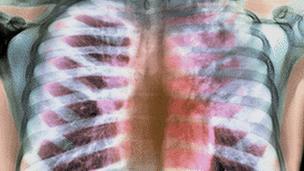More TB screening at Llanelli school after positive tests
- Published

The most common symptom of TB is a persistent cough for more than three weeks
More screening is to be offered at a Llanelli school after a member of staff and three pupils were diagnosed with tuberculosis (TB).
A total of 224 pupils and 80 staff at Ysgol y Strade comprehensive are to be offered testing.
Last month 122 children and 29 staff were tested after a staff member was diagnosed with TB.
Public Health Wales said no-one was believed to be infectious and there was no ongoing risk at the school.
The new round of school testing next Wednesday and Thursday was being carried out as a precautionary measure.
Links between the school and another four cases of TB in the Llanelli area in the last year have been ruled out.
'Very small risk'
Sion Lingard, chair of the incident control team, said: "We are emphasising to pupils, parents and staff that it is rare for TB to be transmitted within a school environment.
"Further screening is being carried out due to the very small risk that others may have picked up the infection within the school.
"All those who are likely to have had some form of contact with the infectious staff member will be screened."
Mr Lingard added that close contact with an infectious individual over a long period, such as living in the same house, is usually required for someone to become infected with TB.
He said the infection was "difficult to catch but treatable with antibiotics".
Bacteria
"Last month Hywel Dda Health Board screened all close contacts of the staff member who was infectious, and those who have since tested positive are not believed to have an infectious form of TB," Mr Lingard added.
"The next round of screening extends this to those with less contact, as a precaution."
TB is an infection usually found in the lungs, but any part of the body can be affected.
People can catch TB by breathing in the bacteria in tiny droplets sneezed or coughed out by someone who has the infection in their lungs.
The most common symptom of TB is a persistent cough for more than three weeks, with spit which can sometimes be blood-stained.
Other symptoms can include weight loss, a high temperature, and sweating, particularly at night.
Public Health Wales said anyone who is concerned about their health should speak to their GP or contact NHS Direct Wales on 0845 46 47.
- Published17 October 2013
- Published1 October 2013
- Published21 August 2013
- Published30 July 2012
- Published24 July 2012
- Published19 March 2011